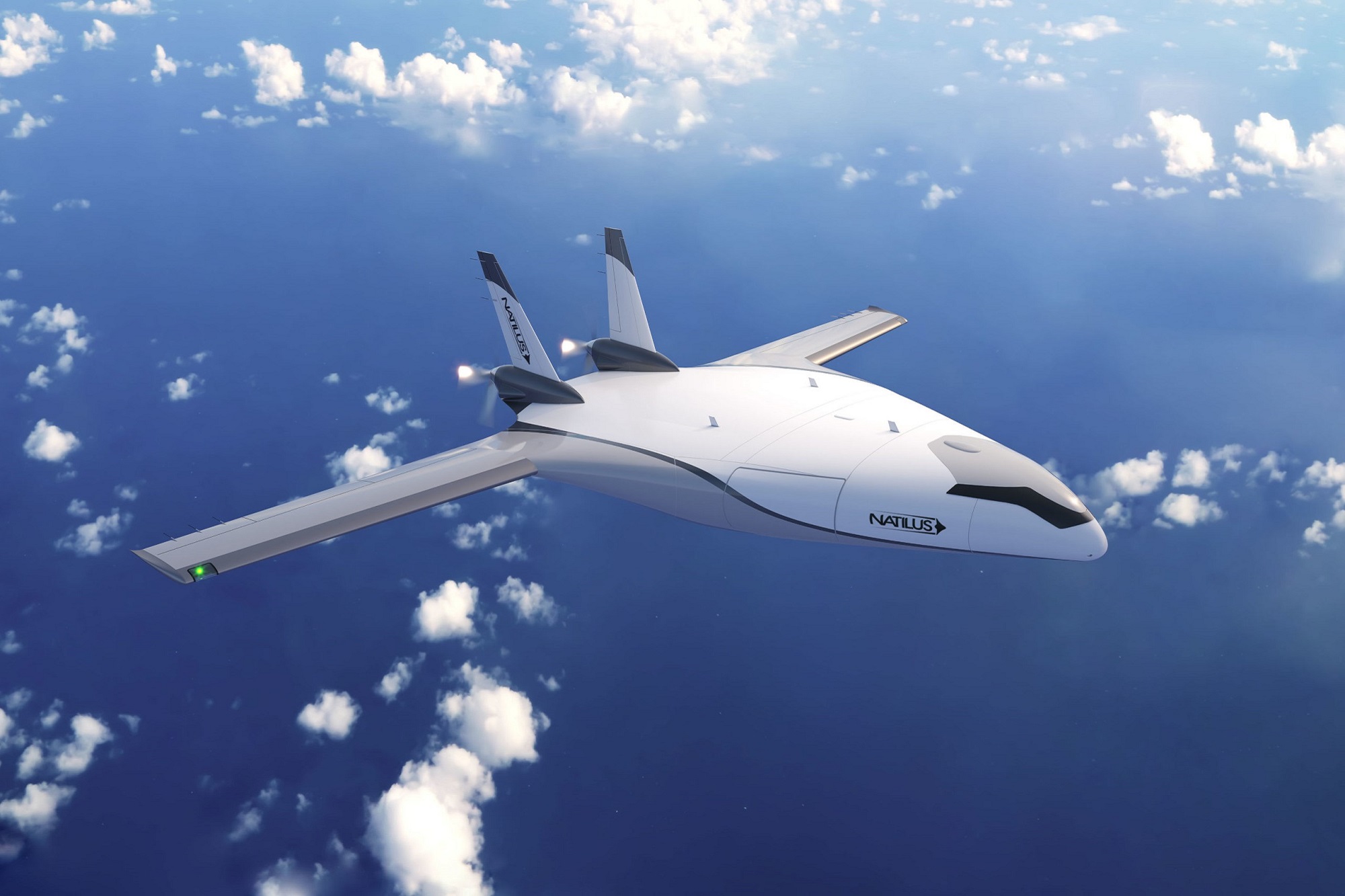New air freight and air cargo aircraft concepts are being driven by the need to find cheaper ways to move goods and a desire to use more eco-friendly ways to transport products from A to B in a world where e-commerce is booming.
Advanced by developments in the electric vehicle takeoff and landing (eVTOL) landscape and hydrogen powered engines, the air freight industry is on the cusp of a revolution that could reshape how companies move goods around the globe.
Congestion on roads and demand from customers are forcing businesses to look for other ways to deliver their products away from traditional land vehicles and trains in domestic markets while internationally there is a desire to deliver larger amounts of cargo and move past the limitations presented by freighters.
And developers offering new aircraft concepts and solutions are making extremely persuasive arguments about why their designs represent the future of air cargo transportation.
AeroTime takes a look at some of the companies looking to disrupt the market with their innovations.
Natilus
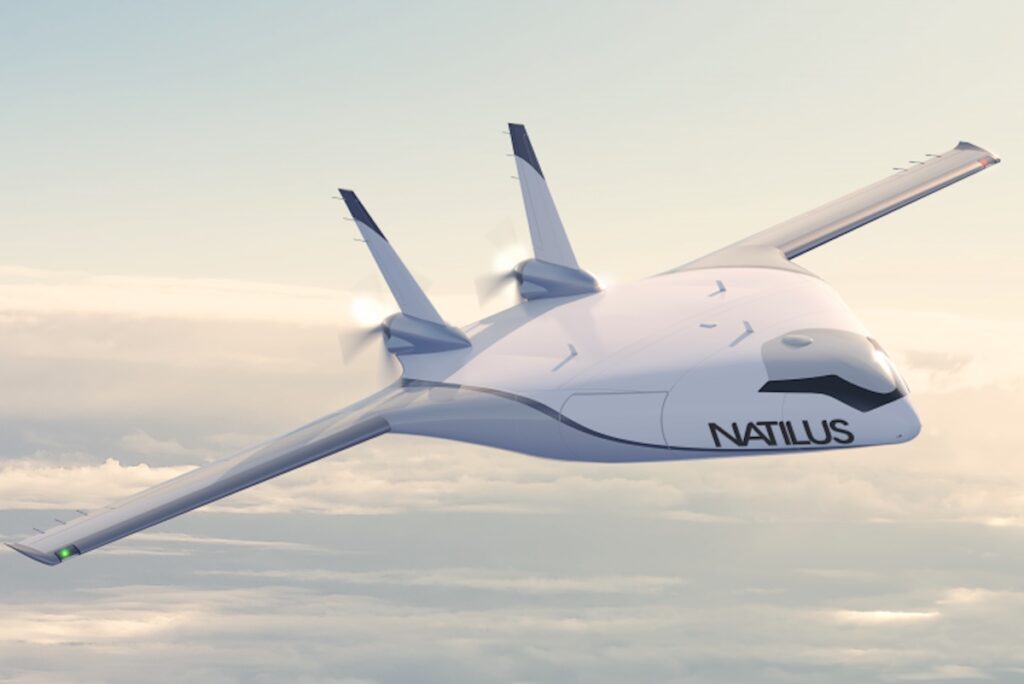

Based in San Diego, United States (US), Natilus has been reimagining the air freight industry since Aleksey Matyushev and Anatoly Star founded the company in 2016.
Natilus has developed three aircraft designs in the same mold, these include the 3.8 ton payload aircraft Kona, the 60-ton payload aircraft Alisio and Nordes, a 100-ton payload aircraft.
Each of the aerial vehicles are being developed to fly without a pilot and are unique in that the design uses a blended blended-wing body (BWB) design.
Natilus told AeroTime that “traditional tube-and-wing aircraft often reach their weight limit before maximizing cargo volume” and that this “limitation” has become even “more pronounced” with the rise of e-commerce.
The BWB design will enable 40% more cargo volume to be transported than on current freighters and across the three aircraft concepts there are cargo delivery solutions for regional, domestic and international markets.
The aircraft will be powered by ZeroAvia hydrogen-electric engines in a deal that was announced in May 2023, with lowering emissions a key part of Natilus’ vision for the future.
Natilus has obsessed over the aircraft design which it said will “significantly reduce” drag and reduce fuel consumption.
After testing the BWB design in a wind tunnel for three years, Natilus began flight tests of its quarter-scale Kona demonstrator aircraft in 2023. The full-size Kona will have a wingspan of 85 feet (26 meters).
The demonstrator was flown by a remote pilot, but Natilus’ overall aim is for the entire fleet to be autonomous with remote pilots based in ground stations monitoring the flights and positioned to take over control of an aircraft if necessary.
As of May 2023, Natilus has more than $6.8 billion in order commitments, and over 460 aircraft in pre-orders with clients including Ameriflight, Volatus Aerospace, Flexport, Astral, Aurora International, and Dymond.
With commitments for aircraft in place, Natilus is confident its “transformative approach to commercial aviation” will increase “capacity, cost efficiency, sustainability, and operational flexibility” for its customers.
“At Natilus, we envision a future where aviation is dramatically more efficient and more sustainable. Our innovative blended-wing-body aircraft are designed to revolutionize the commercial aviation landscape by maximizing capacity, reducing costs, and minimizing environmental impact,” said Jason Wallace, Head of Marketing and Communications at Natilus.
Pyka
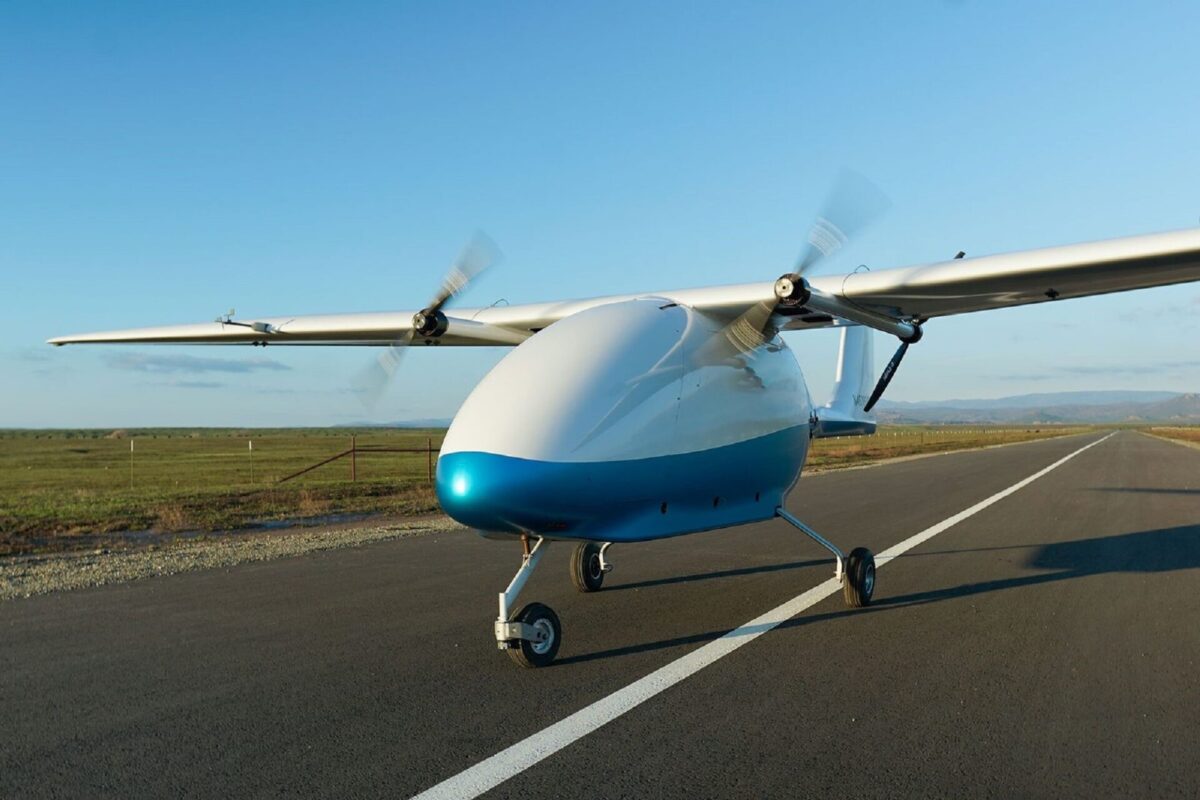

The Californian startup Pyka unveiled its Pelican Cargo drone, the world’s largest zero-emission autonomous cargo Unmanned Aircraft System (UAS), in 2023.
The project began in co-founder Michael Norcia’s parents’ garage before moving to the backyard when space to develop the aircraft became a little tight.
As well as the Pelican Cargo drone, which is being developed to transport 400-pound payloads up to 200 miles, the startup has already tasted success with its Pelican Spray aircraft which is used for crop protection.
The drone was first certified by the New Zealand Civil Aviation Authority in 2019 and received authorization for commercial operation in the US by the Federal Aviation Administration (FAA) in 2023.
Initially there were no plans in place to develop a cargo aircraft but the idea of adapting the technology for this field began to evolve.
However, with stricter rules in place for aircraft flying over inhabited areas the journey to certification will undoubtedly pose more issues.
Pyka told AeroTime that one of the advantages of the Pelican is its “ability to operate in off-airport conditions with minimal ground infrastructure” potentially giving access to isolated areas around the world in need of medicines and supplies.
“Pelican Cargo will enhance express delivery networks, connect isolated regions of the globe, and enable fast and reliable delivery of critical supplies to areas in need,” a spokesperson for Pyka said.
As well as commercial markets, the Pelican is also seen as a game changer for defense logistics.
In January 2024, Pyka delivered the first in a fleet of three Pelican Cargo to AFWERX, the innovation arm of the US Air Force to explore operational use.
“As the only zero-emission cargo UAS in its class, Pelican Cargo offers a cleaner, more adaptable, and more cost-effective solution that can meet the rapidly evolving needs of the modern logistics market,” the Pyka spokesperson said.
Dronamics – Black Swan
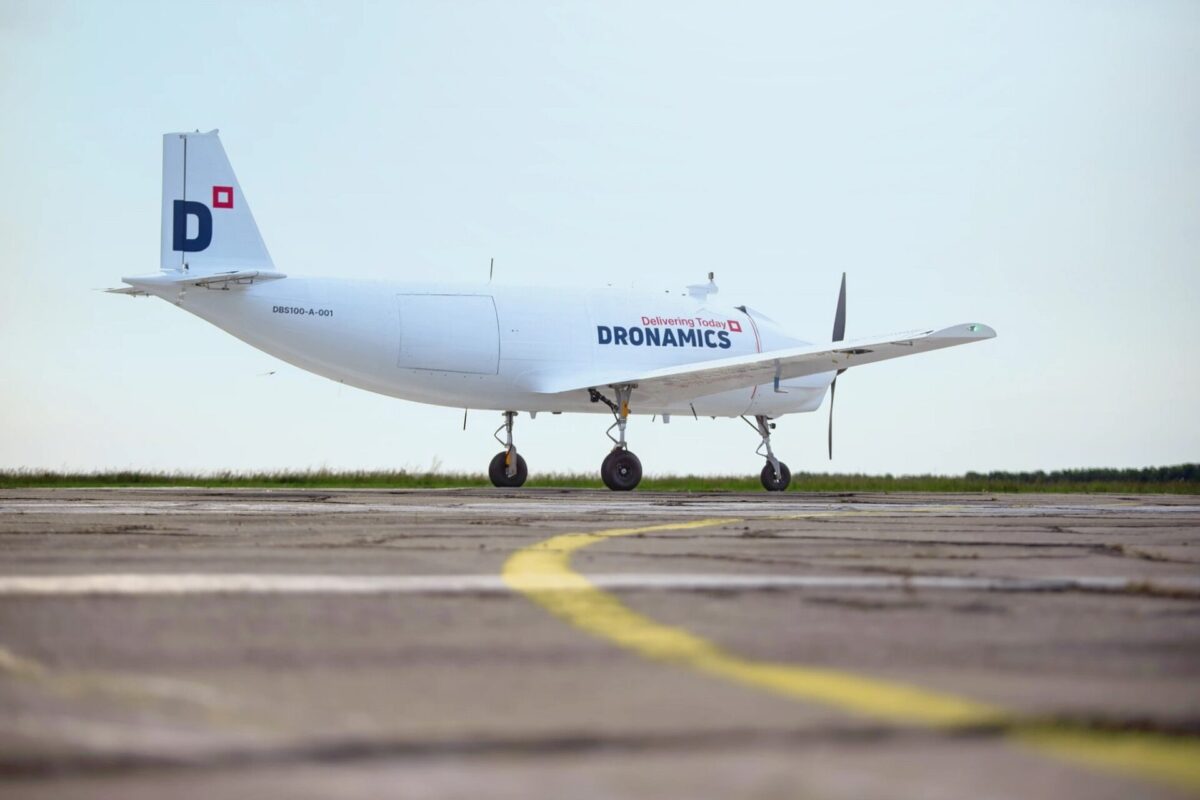

Dronamics ambitiously set out to become the world’s first cargo drone airline after it was established in 2014 by brothers and co-founders Svilen and Konstantin Rangelov in Greece.
The Dronanics drone, Black Swan, has a 16-meter wingspan and was built to carry 770 pounds of freight up to 1,550 miles.
“We believe everyone should have access to same-day delivery. Our operating model is based around serving regional and extra-urban areas,” a spokesperson for the company told AeroTime.
Dronamics believes with the infrastructure and drones in place, companies will be able to deliver goods “up to 80% faster, 50% cheaper and with up to 60% lower emissions than alternative modes of transport, including Airfreight”.
The first phase of the firm’s launch will connect Greece, Italy, Portugal, and Spain followed by the United Kingdom (UK), France and Scandanavia in phase two.
The company is targeting companies in the fields of e-commerce, perishables, luxury goods, health care and medicine and humanitarian aid, among others.
“We believe the middle-mile in logistics is the one most ripe for change, where most bottlenecks and inefficiencies occur and where our solution can make a meaningful difference. We are also looking to establish point-to-point connections, especially for remote and underserved routes, therefore reducing the time and distance traveled by cargo,” the Dronamics spokesperson said.
While the drone is built to use biofuels, Dronamics plans to eventually move to hydrogen power solutions and has partnered with Cranfield Aerospace Solutions (CAeS) hydrogen fuel-cell propulsion system which is currently in development.
As well as developing Black Swan, Dronamics also plans to utilize a network of its own droneports with the aircraft remotely piloted.
Its flagship aircraft first took place in May 2023, in Bulgaria, remotely piloted by two commercial airline pilots from the Dronamics ground control station.
And on July 13, 2024, Dronamics announced that it had been officially assigned both IATA and ICAO designator codes in a first for a drone airline.
“Becoming the first cargo drone airline with both IATA and ICAO designator codes is a testament to Dronamics’ pioneering spirit and our vision for faster, cheaper and green air cargo for everyone, everywhere. This recognition by the leading aviation community reinforces our position on the international aviation map,” Svilen Rangelov said at the time.
And in May 2024, the European Innovation Council (EIC) invested a further $11 million in the company on top of $2.7 million in 2022.
Dronamics’ launch customers include Hellmann Worldwide Logistics (Germany), Hellenic Post (Greece), Emirates Post Group (UAE) and Aramex (UAE) and an interline agreement has been signed with Qatar Airways Cargo.
“Our solution is not a replacement for air freighters but rather, a complement for where they cannot reach due to infrastructure or where it doesn’t make sense economically,” the spokesperson said. “We will operate from smaller, local airports therefore establishing direct connections that currently don’t exist, benefiting remote and underserved routes.”
They added: “We want to be able to reach where others don’t, offering same day delivery to people and businesses everywhere, especially ones currently underserved by traditional networks. Drone technology has the potential to change that.”
Droneliner
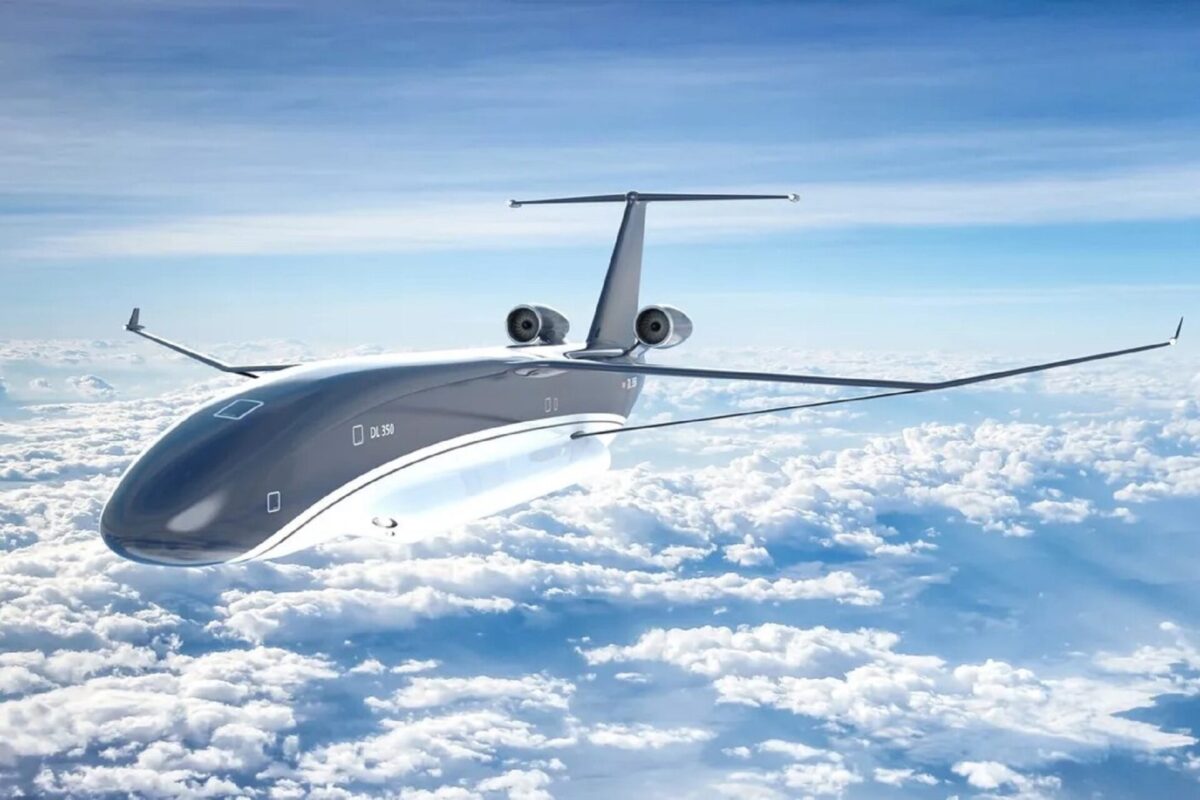

UK-based Droneliner envisions a future where the world’s freight is transported from place to place on humongous, unmanned aircraft.
Droneliner’s two designs include the DL200, which could transport over 36 lightweight 20ft shipping containers and the larger DL350, which could fly over 80 containers.
To put this in context, the DL350 could carry between 300 and 350 tons, the equivalent of lifting around 30 London double-decker buses.
Droneliner argues that air freight is too expensive, and its aircraft could reduce the cost by 70% “whilst also reducing the delivery time and reducing emissions”.
The company also believes that shipping freight suffers badly from “clogged ports” and supply chains that are vulnerable to disruptions.
The DL200 would be electric powered while the DL350 would use two hybrid elective turbofan engines. However, both aircraft would move to hydrogen power when the technology matures.
Design Director for Droneliner, Mike Debens, previously described the new aircraft as “the most exciting new aeroplane since the jumbo jet”.
MightyFly
MightyFly has been developing its autonomous, eVTOL aircraft since 2019 with plans to create a delivery option that rivals the traditional truck and driver.
The aircraft, which takes off and lands vertically, has been built to transport up to 500 pounds of cargo up to speeds of 150 mph over a 600-mile range.
If the aircraft succeeds in its development, it will be used to make same day delivery accessible to businesses of any size that are looking to move goods from urban or rural areas.
While in flight the aircraft will be monitored from the MightyFly command center.
In March 2024, MightyFly announced that it had become the first large autonomous cargo eVTOL company to receive flight corridor approval from the FAA.
The FAA approval includes the Certificate of Waiver or Authorization (COA) for a flight corridor of up to 5,000ft in altitude between the New Jerusalem and Byron Airports in California
On March 4, 2024, MightyFly started flying the 2024 Cento, its third-generation autonomous cargo aircraft, at the flight corridor’s origin airport.
“MightyFly’s mission is to provide fast, affordable, and low emissions-expedited deliveries to businesses and governments. MightyFly is a leading manufacturer and operator of autonomous, fixed-wing, hybrid, eVTOL cargo aircraft with a cargo capacity of 100 and 500 pounds, a range of 600 miles, and a speed of 150 mph,” the company said.

